

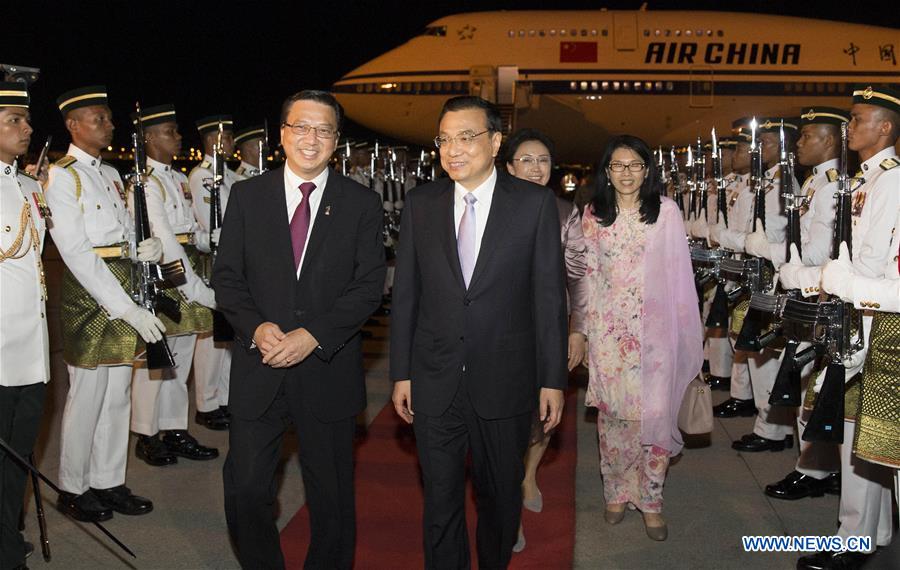 |
| Chinese Premier Li Keqiang (R, front) is welcomed upon his arrival at the Kuala Lumpur International Airport in Sepang, Malaysia, Nov. 20, 2015. Li arrived here Friday for a series of leaders' meetings on East Asian cooperation and an official visit to Malaysia. (Xinhua/Huang Jingwen) |
KUALA LUMPUR, Nov. 20 -- Chinese Premier Li Keqiang arrived here Friday for a series of leaders' meetings on East Asian cooperation and an official visit to Malaysia.
During his four-day stay in the Southeast Asian country, Li is scheduled to attend the 18th China-ASEAN (10+1) leaders' meeting, the 18th ASEAN-China, Japan and South Korea (10+3) leaders' meeting and the 10th East Asia Summit before paying his first official visit to Malaysia as the Chinese premier.
Li said upon his arrival that China and countries of the Association of the Southeast Asian Nations (ASEAN) have linked destinies, shared interests and feelings.
He expected to discuss on topics such as promoting regional development, building consensus of cooperation, jointly safeguarding regional peace, stability and prosperity and creating stable economic growth with other leaders at the meetings.
The premier also said that he looks forward to having an in-depth exchange of views with Malaysian leaders on deepening the China-Malaysia comprehensive strategic partnership and lift bilateral practical and mutually beneficial cooperation to a new level.
MAJOR CORNERSTONE
China was the first country to establish a strategic partnership with ASEAN, and the first non-ASEAN signatory to ink the ASEAN Treaty of Amity and Cooperation.
Seven out of the 10 ASEAN members are continental or maritime neighbors of China as close trade and economic ties have also linked the two prominent economies in the region.
Statistics show that China remains ASEAN's biggest trading partner while ASEAN is China's third largest trading partner. Their bilateral trade in the first 10 months of this year reached nearly 400 billion U.S. dollars.
An ASEAN community, which is expected to take shape by the end of this year, will be the first sub-regional community in Asia. Li called the event "a milestone in the regional integration."
China hopes the coming meetings in Malaysia will push forward negotiations on the upgrading of the China-ASEAN free trade area (FTA), promote the negotiation of the Regional Comprehensive Economic Partnership (RCEP), speed up the construction of the 21st Century Maritime Silk Road and boost East Asia's economic growth against the backdrop of a global slowdown.
The China-ASEAN FTA is the largest among developing countries. The two sides are striving to finish negotiations on the upgrade before the end of this year.
The 21st Century Maritime Silk Road is a part of the Belt and Road initiative proposed by Chinese President Xi Jinping in 2013 with an aim of reviving the ancient trade routes and strengthening regional inter-communication.
During the 10+1 leaders' meeting, Li will discuss China's ASEAN policy and propose measures to enhance cooperation in areas including production capacity and inter-connectivity.
Analysts believe that the 10+3 leaders' meeting, which will be held weeks after the resumption of the China-Japan-South Korea tripartite summit in Seoul following a three-and-half-year break, will speed up negotiation on a trilateral FTA and the RCEP to build up the East Asia economic community.
Next year marks the 25th anniversary of the China-ASEAN dialogue partnership. Observers have said that Li's ongoing visit is vital to the development of the China-ASEAN strategic partnership for peace and prosperity.
In a signed article published by major Malaysian newspapers ahead of his trip, Li dubbed China-ASEAN relations "a major cornerstone for peace, stability, development and prosperity in the region."
Countries in the region should cherish the harmonious coexistence of different cultures and development paths, and work together to uphold regional peace and stability in the long run, he said.
NEW STARTING POINT
During his trip to Malaysia, Li will hold talks with Malaysian leaders, address a forum of bilateral economic cooperation, visit the Malacca State and witness the signing of a series of documents ranging from agreements on trade and culture exchanges to judicial cooperation.
Chinese authorities have said that Li's current trip is expected to upgrade bilateral cooperation in trade, investment, the Belt and Road initiative, marine industry and infrastructure construction.
The bilateral trade volume between China and Malaysia stands at over 100 billion dollars annually as mutual investment has been growing rapidly. Malaysia has been the largest trading partner of China among ASEAN countries in the past seven years, while China remains Malaysia's biggest trading partner.
In his article, Li said that his country and Malaysia are "standing at a new starting point for development in China-Malaysia relations."
He said that the two countries should continue to view and grow relations from a strategic perspective, deepen strategic mutual trust, advance mutually beneficial cooperation, expand people-to-people and cultural exchanges, and carry forward their traditional friendship.
ASEAN, which was founded in 1967, consists of Indonesia, Malaysia, the Philippines, Singapore, Thailand, Brunei, Cambodia, Laos, Myanmar and Vietnam. Malaysia holds the ASEAN rotating chair this year.
Day|Week

 118-meter-high Never-used Building in NW. China Demolished
118-meter-high Never-used Building in NW. China Demolished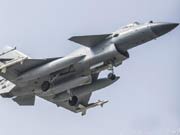 J-10B fighters with homegrown engine in test flight
J-10B fighters with homegrown engine in test flight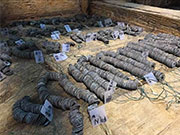 10 tons of copper coins unearthed in 2,000 years old ancient tomb
10 tons of copper coins unearthed in 2,000 years old ancient tomb Beautiful graduate from police college becomes Internet hit
Beautiful graduate from police college becomes Internet hit Photos of U.S. Navy intruding in South China Sea released
Photos of U.S. Navy intruding in South China Sea released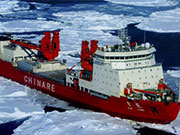 What is inside China's icebreaker ‘Xuelong’?
What is inside China's icebreaker ‘Xuelong’? Chinese, U.S. navies hold first-ever joint exercise in the Atlantic
Chinese, U.S. navies hold first-ever joint exercise in the Atlantic In pics: skies of glory
In pics: skies of glory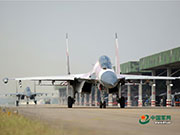 J-10, J-11, Sukhoi Su-30 fighters vs. HQ-9 anti-aircraft missile system
J-10, J-11, Sukhoi Su-30 fighters vs. HQ-9 anti-aircraft missile system Russian plane crash victims sucked out of seats as 'external impact' blew jet apart
Russian plane crash victims sucked out of seats as 'external impact' blew jet apart